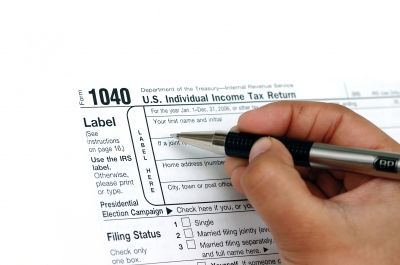Employment taxes vary widely, depending on the withholding allowances and filing statuses employees claim. They may also vary, according to the state and city in which the employer and worker reside. Employers must remit the withheld income and FICA taxes to the government every quarter. They must also send in their share of FUTA and SUTA taxes. Self-employed individuals, though, are responsible for remitting their taxes themselves, since self-employeed taxpayers have no employers.
Types of Employment Taxes
Tax Credits for Higher Education
Have you or one of your family members been thinking about returning to college? As the recession drags on, more and more Americans are deciding to return to school to complete a degree or switch careers. While the U.S. government provides several financial aid sources, taxpayers may still have to pay some of their education expenses out of their own pockets. To ease this financial cost, the IRS allows individuals to take advantage of two education tax credits: The Lifetime Learning Credit and the American Opportunity Tax Credit.
What You Need to Know About the Indoor Tanning Services Excise Tax
In 2010, the U.S. government instituted a new excise tax that applied only to establishments that provide indoor tanning. This additional charge, called the Indoor Tanning Services Excise Tax, took effect on July 1, 2010, and was part of a government program to increase revenue and discourage the practice of indoor tanning, which has been shown to pose substantial health risks. Establishments that offer indoor tanning are now required to submit a 10 percent tax based on their revenues from their businesses.
Penalties for Failure to File IRS Taxes
The IRS imposes two common tax penalties on taxpayers who fail to file their tax returns or fail to pay their tax liability. Depending on the circumstances, some taxpayers may actually be subject to both penalties, significantly increasing their tax bill. However, simply failing to submit a tax return does not necessarily mean that a taxpayer will have to pay a tax penalty. Much depends on whether the taxpayer owes an additional balance due to the IRS.
When the IRS issues a federal tax lien, it lays claim to the profits from a sale of property. For taxpayers who owe large amounts of money to other obligations, though, this can pose real financial problems, especially if they are unable to meet their other obligations on their own. In some cases, the IRS is willing to allow other creditors to receive profits from the property sale ahead of the government. This process is done by applying for a certificate of subordination of a tax lien. However, since the agency does not grant all of these requests, it is essential that taxpayers who apply for the certificate follow the application guidelines carefully.
Reduce Taxes Using the Voluntary Classification Settlement Program
In some cases, employers who hire workers may find that their employees actually meet the standards for independent contractors. If this is the case, these business owners may be submitting payroll taxes on their employees' income when it is not legally required. The good news is that the IRS now allows these employers to change the status of their workers for tax purposes if they meet certain conditions. The arrangement for this change is called the Voluntary Classification Settlement Program (VCSP).
What is the FICA Tip Tax Credit?
Service businesses such as restaurants, bars, and salons often receive tips in addition to their payments for services rendered. Tips are usually given in appreciation for exceptional service or to ensure that the individual server or salesperson receives a portion of the profits. While business owners do not receive income from the tips, they are often required to match FICA taxes, which include Social Security and Medicare taxes, on these payments. Under a special tax credit called the FICA Tip Tax Credit, though, small business owners can claim a tax credit that reduces their share of the matching FICA taxes on tips.
Federal Tax Liens: Release vs. Withdrawal
The prospect of resolving a federal tax lien can be a frightening one for any taxpayer. Owing a large amount of money to the IRS can make it difficult for taxpayers to take care of their other responsibilities, which may prevent them for collecting funds to repay their obligation. Once a tax lien has been enforced, the IRS will only remove it after the full obligation has been paid. However, the agency can do this through either a tax lien withdrawal or a tax lien release. The end result of both processes is the same, but the manner in which the IRS removes the lien can have a significant impact on taxpayers' credit ratings.
HIRE Act: Tax Credit for Your Small Business
Following the economic recession of 2008-10, the United States government took extraordinary measures to attempt to shore up the national economy. One of the major areas of concern was unemployment. Rising unemployment figures pushed the national unemployment rate up to 10 percent, placing a strain on federal unemployment funds.
How to Use the Foreign Tax Credit to Reduce Your Tax Liability
Taxpayers who are subject to foreign income taxes may qualify to take a foreign tax credit against their U.S. tax liability. In most cases, these foreign income taxes are levied on individuals who have partial-year residency in a foreign country or who receive income from foreign-based business activities. The IRS has created the foreign tax credit to help taxpayers offset these additional charges.
SUBSCRIBE VIA EMAIL
POSTS BY TOPIC
- Tax Tips and Help (285)
- IRS Collections (121)
- IRS Audit (72)
- Tax Credits and Deductions (70)
- Tax Resolution (62)
- Business Taxes (54)
- Back Taxes (48)
- Wage Garnishment (21)
- Tax Levies (19)
- IRS Payment Plans (15)
- Tax Liens (14)
- Offer in Compromise (9)
- Unfiled Tax Returns (9)
- IRS Tax Attorneys (7)
- Asset Seizure (6)
- Tax Evasion (6)
- Criminal Tax Defense (4)
- Innocent Spouse Relief (4)
- Alimony (1)











